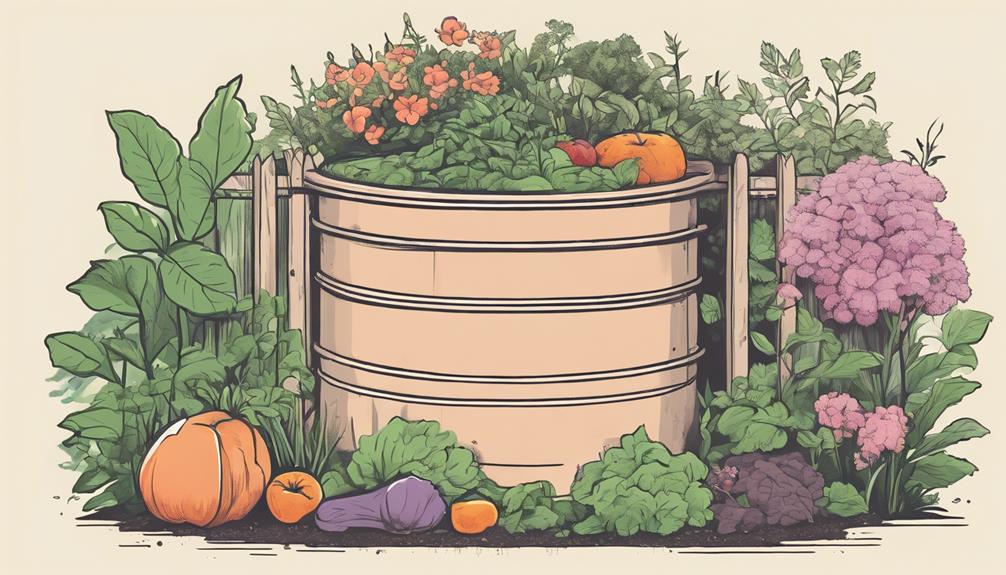How To Become More Self-Sufficient Without Starting a Full-Blown Farm…
Want to start preserving your harvest, making your own soap, or building a backyard root cellar — but not sure where to begin? “Homesteading Advice” gives you instant lifetime access to 35+ practical homesteading books on food preservation, veggie gardening, DIY natural cleaning products (save over $250 per year with this skill alone), brewing, off-grid energy, and a whole lot more…
Click Here To Check It Out Now!
“We’ve recently started composting in our backyard and noticed an unpleasant smell coming from the pile. We’ve tried to follow various guidelines, but nothing seems to work. We’re worried that this might affect our neighbors or even our enthusiasm for backyard farming. How do we prevent our compost from smelling? We’d appreciate any tips or solutions you might have for us. Thanks!”, James, Portland, USA.
Understanding the Basics of Composting
Composting is a fantastic way to recycle organic waste and enrich your soil, but it can sometimes develop unpleasant odors if not managed correctly. Smelly compost often indicates that there is an imbalance in the composting process. Let’s explore some ways to keep your compost pile odor-free and efficient.
The Perfect Balance: Carbon and Nitrogen
Compost relies on a balance of carbon-rich “browns” and nitrogen-rich “greens.” Getting this balance right is crucial to managing odors.
Why Balance Matters
- Carbon-rich materials like leaves, straw, and cardboard help to aerate the pile and break down more slowly. They keep the pile from becoming too wet and compacted.
- Nitrogen-rich materials such as grass clippings, food scraps, and manure provide the necessary proteins and enzymes that fuel microbial activity.
A good rule of thumb is to aim for a ratio of about 3 parts browns to 1 part greens. This will help ensure that your pile gets enough air and that the composting process is efficient.
Maintaining Proper Aeration
A common cause of smelly compost is a lack of oxygen. Compost piles need to be turned regularly to ensure they are getting enough air. Oxygen-starved piles tend to develop anaerobic conditions, which produce foul-smelling compounds.
Turning Your Pile
Turn your compost pile every two weeks. Use a pitchfork or a compost aerator to mix the materials and allow air to circulate. This also ensures that the materials are breaking down evenly.
James, ensuring your pile is well aerated will greatly reduce or eliminate any bad smells.
Managing Moisture Levels
Moisture is another critical factor in controlling compost odors. Too much moisture can create anaerobic conditions, while too little can slow decomposition.
Ideal Moisture Content
The compost pile should be as moist as a wrung-out sponge. If it’s too wet, add more browns to soak up excess moisture. If it’s too dry, add water or greens to increase the moisture level.
Consider covering your compost pile during heavy rainfall to prevent it from becoming waterlogged. Proper drainage at the base can also help manage moisture levels.
Avoiding Problematic Ingredients
Certain materials should be avoided in your compost pile as they can lead to unpleasant odors and other issues.
What to Avoid
- Meat, bones, and dairy products: These can rot and emit strong odors, and they may also attract pests.
- Oily foods: Fats and oils can create a greasy mess and slow down the composting process.
- Large amounts of citrus peels and onions: These can be overly acidic and may disrupt the microbial balance.
Stick to plant-based kitchen scraps, yard waste, and paper products to maintain a healthy and smell-free compost pile.
Using Beneficial Microorganisms
Microorganisms play a vital role in breaking down organic matter in your compost pile. If you find that your compost is still smelly even after balancing browns and greens, aeration, and proper moisture control, beneficial microorganisms might be the key.
Adding Microbial Inoculants
Consider introducing beneficial microorganisms known as compost starters or inoculants. These products are available at garden centers and can help accelerate the decomposition process while keeping odors at bay.
Layering Your Compost Pile Properly
Layering can help manage odors by ensuring that nitrogen-rich materials are covered by carbon-rich materials, which helps to absorb odors and promote aerobic conditions.
Effective Layering Techniques
Start with a layer of coarse materials like straw or small branches at the bottom to improve drainage and aeration. After that, alternate between layers of greens and browns, making sure to cover each layer of food scraps or grass clippings with a layer of leaves, straw, or shredded paper.
James, layering is a simple yet effective way to maintain a healthy, smell-free compost pile.
Keeping Pests Away
Rodents and other animals can cause compost to smell by digging through it and exposing anaerobic pockets. Keeping pests away is important for maintaining a balanced compost pile.
Methods to Deter Pests
- Use a compost bin with a lid to contain smells and keep pests out.
- Turn your pile regularly to discourage nesting.
- Rodent-proof your pile with a layer of wire mesh at the bottom of your compost bin.
Using a Compost Bin or Tumbler
Traditional compost piles can sometimes be more challenging to manage. Using a compost bin or tumbler can help contain smells and make the process easier to control.
Benefits of Bins and Tumblers
- Containment: They help contain smells and keep pests out.
- Easy to Turn: Tumblers, in particular, make it easier to turn your pile, ensuring good aeration.
- Regulated Moisture: Bins often come with features to regulate moisture, making maintenance simpler.
Final Thoughts…
James, thank you for your question. Remember, the key to preventing compost from smelling is about maintaining the right balance, ensuring proper aeration, managing moisture levels, and being cautious about what goes into your pile.
By following these tips, your backyard compost will become a productive, odor-free part of your garden. Happy composting!

